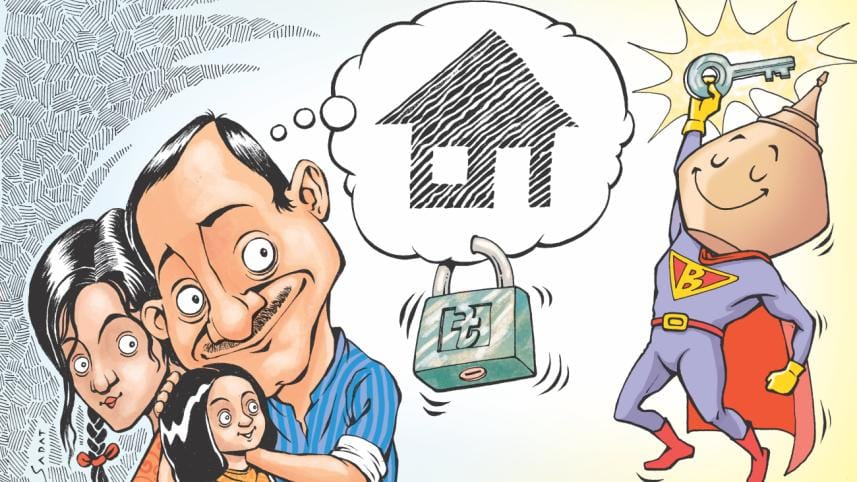Affordable home: beyond reach of many

Dhaka has emerged as one of the fastest-growing megacities in recent times with a population of nearly 20 million.
The proliferation of urban settlement in Dhaka since the 1990s has made it the most prime real estate location of the country. So, the city has expanded both vertically and horizontally, to meet the growing demand.
Accordingly, Dhaka's housing market is increasingly becoming buoyant, with demand often outpacing supply. New areas have also emerged as preferred destinations for living.
Until the 1980s old Dhaka was the preferred area for living. Since then it has been Dhanmondi and Gulshan that were the locations of choice for most.
The demand continued until it got exhausted in 2000s. After that, areas like Uttara, Mohammadpur and Mirpur have seen phenomenal growth.
Now real estate developers are exploring new locations, such as Badda, Basabo, Bosila, Manikdi and other places to attract ever growing middle- and lower-income working class with an affordable price. Community housing is also taking place in recent times.
This phenomenal growth in the housing sector has helped allied industries such as cement, steel, ceramics, paints, cables and other construction materials to grow significantly over the years.
“We have seen tremendous demand for housing in Mirpur in recent years,” said Tarek Reaz Khan, head of retail and SME of Mutual Trust Bank.
The demand for a flat of 1,100-1,500 square feet, which costs from Tk 75 lakh to Tk 95 lakh, has been rising at 15-20 percent a year, according to Khan.
Mirpur has seen itself evolve into a destination for the middle-class families, according to a recent Lamudi Bangladesh study.
Within all price ranges, there is a mismatch between supply and demand, especially for the lower- and higher-end apartments valued between Tk 3,716 and Tk 4,645 per sq ft, followed by Tk 4,645 and Tk 5,574 per sq ft, found the study.
In terms of the demand relative to the supply of these units, those in the range of Tk 3,716 to Tk 4,645 sq ft receive a huge amount of interest: almost 12 people are interested in every unit listed on Lamudi.
For units priced between Tk 46.45 lakh and Tk 55.74 lakh, there are at least five people interested for every unit.
But most buyers are looking for flats priced lower than this.
The apartments listed for sale for Tk 37.16 lakh or below only represent 7 percent of the total demand in Mirpur.
The disparity between the interest and the lack of supply of apartments across all price ranges is what investors or developers can focus on in terms of determining what future residential projects would be most viable, Lamudi said.
Against this backdrop, lenders are coming forward to buyers' assistance. Around 50 banks and a half dozen non-bank financial institutions have developed different products to attract home buyers.
Of these lenders, Mutual Trust Bank, Eastern Bank, IDLC Finance, Delta-Brac Housing and National Housing and Finance, City Bank and Standard Chartered Bangladesh are some of the major players.
Some specialised organisations have also emerged to meet the growing demand for housing loans. Established in 1996, Delta Brac Housing is such a pioneer specialist housing finance institution in the private sector.
“A decline in interest rate has pushed up the demand for home loans,” said Arif Khan, managing director of IDLC Finance that has a home loan portfolio of Tk 2,200 crore now.
The average interest for home loans has come down to 10.50 percent from 13 percent six months ago, he said.
IDLC offers 9.99 percent interest for its prime borrowers.
Home loan seekers are mostly salaried persons, Khan said.
Still, many people's dreams remain unfulfilled as they find they cannot buy a decent flat even with home loans.
Take, Rabiul Islam, 40, a mid-level employee of a private enterprise who lives in the city's Rampura area with his wife and two children, as an example. He has been dreaming of being a homeowner for long, but that dream is yet to materialise.
He has been eyeing a 1,100 sq feet flat in Rampura, which would cost him Tk 60 lakh including registration fees.
“But I cannot afford more than Tk 20 lakh as equity,” said a shattered Islam.
If he takes a Tk 40 lakh loan at the present interest rate of 11 percent for a tenure of 15 years, he would have to pay Tk 45,464 a month. After paying loan instalments he would not have adequate funds to run his family.
Another developer, he said has been asking Tk 6,950 a sq feet for a flat at Aftabnagar in Badda area.
Knowing this pain of prospective home buyers, Mutual Trust Bank has recently developed a product aiming to provide equity finance.
Borrowers can pay back the loan (equity) when they get annual and festival bonuses, Khan said.



 For all latest news, follow The Daily Star's Google News channel.
For all latest news, follow The Daily Star's Google News channel.
Comments